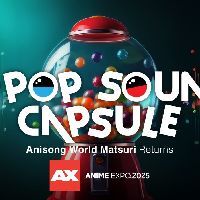This article was written by Izuka-kun and edited by pompy and DarkTyDe of the MAL Articles Club.
Interested in writing or editing for us? Click here!
Within any medium of entertainment, whether it is anime, drama, or even regular movies, music has always been a major factor that drives a show into succeeding or failing. It is easy to overlook the importance of music in anime since it is not the major theme discussed in the story, except for musical anime like Shigatsu wa Kimi no Uso (more on that later). However, an anime can have its narrative become much stronger with the presence of good music. Likewise, bad music can also destroy what ought to be a good anime. But what defines good and bad music? After all, music, like the anime itself, is subject to preferences and tastes that differ from one person to another. Although this is definitely true for the most part, good music in the context of anime can be loosely defined as any music that impacts the story in a good way. This means that if a piece of soundtrack clashes with the settings of the scene and ends up contradicting the theme of the story, it is not enough to be considered 'good music'—even if, on its own, it sounds amazing. Music in anime cannot be judged in an isolated chamber, free from the settings of the story, because the whole point of music in anime is to make the audience immerse themselves in the show. With that said, there are many ways that music has managed to impact an anime, and I’m going to explore them.
First and foremost, a score that is creative, unique, and outside-the-box can give an anime a distinct layer of identity to set it apart from the rest. The first example that comes to mind is Hellsing. Many fans argue that Hellsing Ultimate was better than the original Hellsing in terms of plot, character development, and enjoyment. It's hard to argue otherwise, but anytime someone mentions Hellsing or Hellsing Ultimate, the score for the original pops up in my head instead. Don't get me wrong, Ultimate did not have bad music—the orchestral music was okay, it's just that the original had such a memorable piano score that it's impossible to forget it.
Another example is Tokyo Ghoul. No one, absolutely no one, can forget the opening theme "Unravel". However, if you asked most people to sing the opening theme of Tokyo Ghoul √A, they wouldn't be able to, since it's just too unmemorable compared to its counterpart. If I mention Shingeki no Kyojin, Neon Genesis Evangelion, or Cowboy Bebop, most of us are very familiar with all three openings. Some of the fans of these series can even sing all 3 word for word. This goes to show that having a distinct sound can make an anime develop an identity tied to that piece of music.
https://www.youtube.com/watch?v=uMeR2W19wT0
Second, music is able to convey the feelings and thoughts within the characters, whether it is through the lyrics, melody, or overall ambience. Kimi no Na wa. is the biggest anime movie in recent memory, and its popularity is mostly due to the contribution of RADWIMPS. The entire movie was filled with piano scores which were played at precisely the right moments to amplify the emotions of the scenes. One scene in particular made it obvious that Makoto Shinkai and RADWIMPS absolutely nailed it. It's this scene right here:
https://www.youtube.com/watch?v=aReksmATETE
The moment Taki forgot Mitsuha's name, the song "Sparkle" started playing, and it was absolutely fantastic. The melody and lyrics literally summed up what Taki and Mitsuha meant to each other. Mitsuha is seen in this scene trying to save her town from the comet, while Taki is distraught from forgetting her name. A part of the lyrics goes, "Tagai no sunadokei nagame nagara kisu wo shiyou yo sayonara kara ichiban tooi basho de machiawase yo," which means, "Let's kiss as we watch each other's hourglasses, and let's meet up at the place farthest from goodbye". The hourglass refers to the short time they have with each other, and how they should spend their remaining time together as opposed to leaving (sayonara). The song can be analyzed line by line, but then this article wouldn't end.
Third, music can generate the mood necessary for individuals to enjoy a particular anime. A perfect example would be Kono Subarashii Sekai ni Shukufuku Wo! 2. The opening of KonoSuba 2, "Tomorrow", is a very cheerful and happy opening, and creates this mood of 4 friends happily adventuring the bright, cheerful world. Most of the time, I caught myself and others smiling after the opening had been played, even though the show hadn’t even started yet. This enables the story to become even more immersive for the audience, as the themes match the mood and emotions that the viewers are experiencing at that precise moment. Another brilliant example would be Gekkan Shoujo Nozaki-kun. The opening, "Kimi Ja Nakya Dame Mitai," amused most fans as much as the anime itself did. Just listening and watching the opening was hilarious and got most of us laughing, which made it easier for the subsequent humor to reach and amuse us.
https://www.youtube.com/watch?v=EjgOD9vruTE
On that point, music can also be associated with strong emotions. The ending of Ano Hi Mita Hana no Namae wo Bokutachi wa Mada Shiranai., "Secret Base ~Kimi ga Kureta Mono~," is always played right after a tear-jerker scene. After a while, we are conditioned to associate sadness with the track, and whenever we hear it again, the sad emotions come pouring back out. Another example of a musical piece that is able to be associated with strong emotions is "Ballade No. 1 in G Minor, Op. 23". Yes, a piano score. Unless you haven’t watched Shigatsu wa Kimi no Uso, just hearing 2 seconds of this song will make you cry an ocean.
https://www.youtube.com/watch?v=SohbADutrUE
Not only can music be associated with emotions, but it can also be associated with the memories from that anime. Remember the awesome Tokyo Ghoul opening from season 1? At the very end of season 2, an acoustic version of "Unravel" was played, and boy, did nostalgia hit us hard. Some fans admittedly cried at the end; and personally, I thought that this part was genuinely awesome too, despite Tokyo Ghoul √A being very unmemorable for most Tokyo Ghoul fans. This shows that not only do we associate music with memories, but a "bad" anime adaptation can be made better with good music.
Finally, music in anime that matches our preferences can make the anime much more enjoyable, just because of that said music piece. It is not inaccurate to say that almost every anime fan has their own personal top 10 opening or closing theme songs. This is because with the plethora of anime, there is also a plethora of genres and music styles to suit everyone’s tastes. Whether it is "Renai Circulation" from Bakemonogatari, "Flyers" from Death Parade, "Uragiri no Yuuyake" from Durarara!!, or even "Blue Bird" from Naruto Shippuden, everyone has their own favorite. But, when you think about it, it is most likely true that your favorite opening is from an anime that you enjoyed, even if it wasn't your all-time favorite. This is because the opening that we grew to love had changed the way we saw the anime. Just listening to the song made it almost impossible to see the series from an unbiased point of view.
In conclusion, without the music that many of us tend to overlook, our anime experience wouldn’t be half as good. Music amplifies the emotions that a viewer experiences whilst watching, hence aiding the narrative of the story to become much stronger. There may be scenes where the absence of music felt natural and made the scene better (for example the scene in the last episode of Plastic Memories but generally for most cases, music is a critical factor in strengthening the narrative. It's time that we give more credit to the musical geniuses behind the success of an anime, and support their work by buying some of their albums. After all, making music scores in anime is far from easy. RADWIMPS, the band that was responsible for not only the opening and closing themes of Kimi no Na wa., but also the entire OST of the movie, had to make the entire score under a very strict deadline and small budget. This led to the members recording the music using their own instruments at their own homes, not in a studio! This eventually led to the creation of what is thought to be one of the best soundtracks in anime film history. In Shigatsu wa Kimi no Uso, the music tells the entire story and without the music scores, the plot wouldn't be able to exist. Arima Kousei may have asked himself, "Did it reach her?" when he played the final song in the series. Unknowingly, it not only reached Kaori, but it also reached the millions of people who cried in awe of such a beautiful, emotional song in what was a brilliantly scripted anime. Without a doubt, music is one of the biggest pieces in an anime’s success, if not the biggest.
Got feedback? Leave a comment here!




